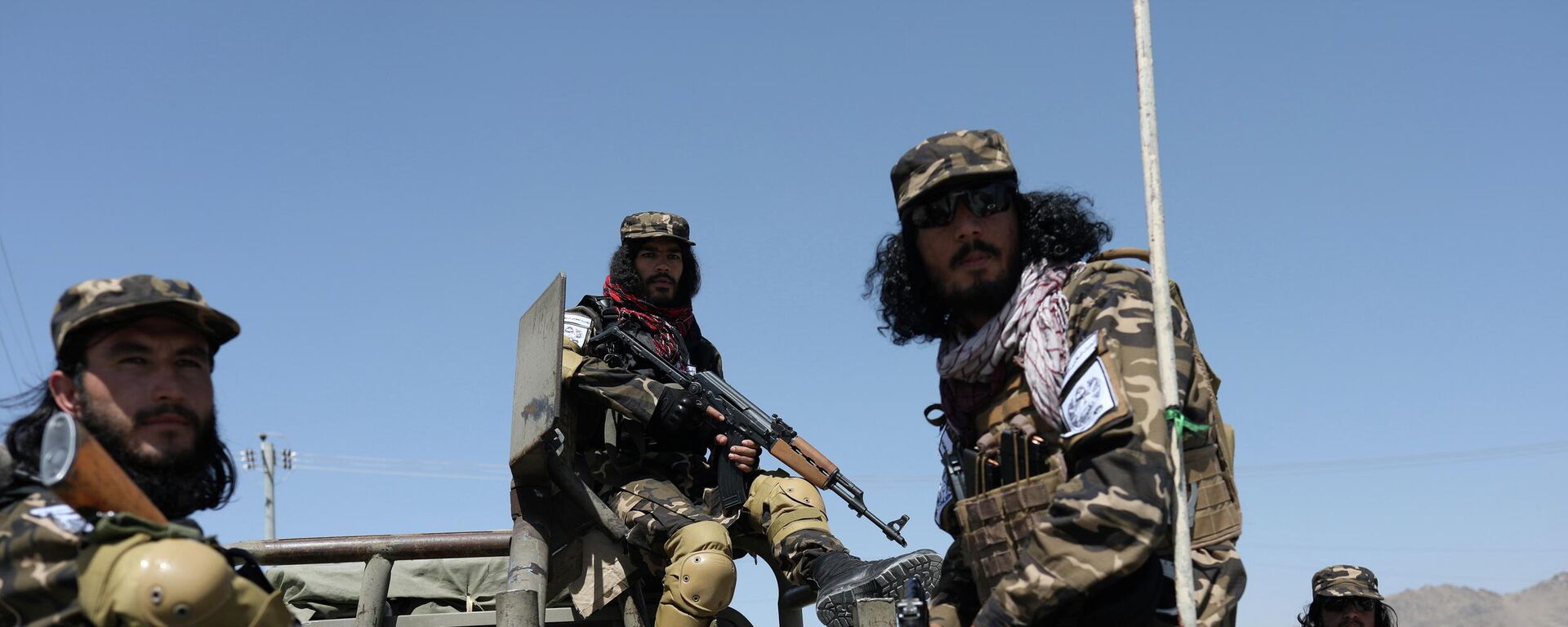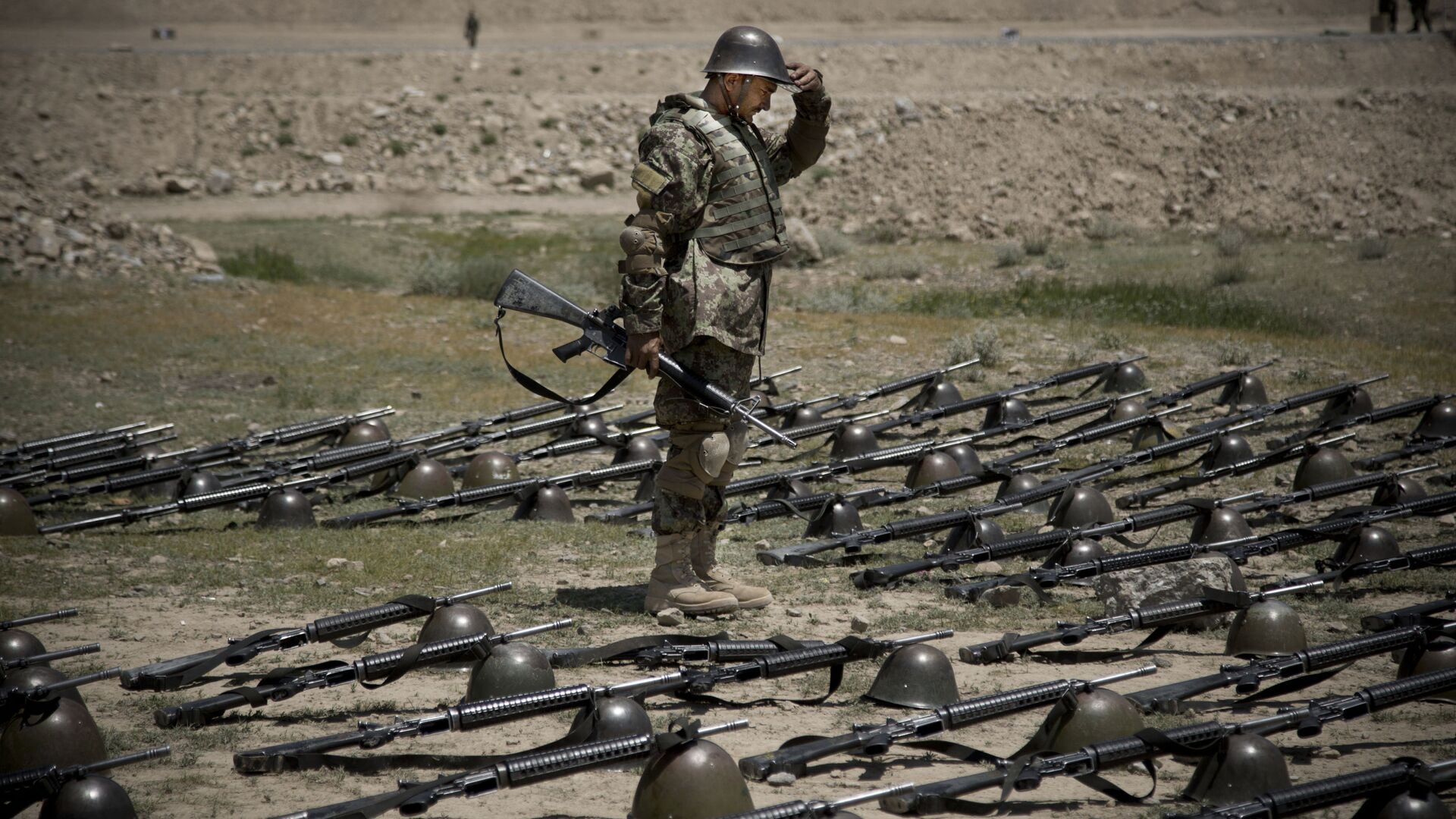https://sputnikglobe.com/20211111/ex-afghan-finance-minister-says-ghost-soldiers-to-blame-for-afghanistan-fallout-1090663128.html
Ex-Afghan Finance Minister Says 'Ghost Soldiers' to Blame for Afghanistan Fallout
Ex-Afghan Finance Minister Says 'Ghost Soldiers' to Blame for Afghanistan Fallout
Sputnik International
In October, Special Inspector General for Afghanistan Reconstruction (SIGAR) John Sopko said that US government agencies didn't sufficiently conduct... 11.11.2021, Sputnik International
2021-11-11T18:09+0000
2021-11-11T18:09+0000
2021-11-11T18:09+0000
afghanistan
us
afghanistan
ghost soldiers
us troops
military
https://cdn1.img.sputnikglobe.com/img/07e5/08/14/1083665094_0:0:3223:1813_1920x0_80_0_0_1448d1726a2a87aa76e6cced4be67cad.jpg
The government of Ashraf Ghani failed in Afghanistan due to corrupt officials who supported "ghost soldiers" and accepted payments from the Taliban*, ex-Afghan Finance Minister Khalid Payenda told the BBC.According to the former Afghan official, most of the 300,000 troops and police on the government's books did not exist. The so-called "ghost" personnel were included in the government lists only so that generals could profit from it.The numbers, according to him, could have been inflated by more than six times, and included "desertions [and] martyrs who were never accounted for because some of the commanders would keep their bank cards" and thereby appropriate their salaries.The existing troops, Payenda continued, were often not paid on time, while some leaders of the government-backed militia would be "double-dipping" - both receiving salaries from the government and accepting payments from the Taliban to give up without a fight.However, he said he did not believe that Ashraf Ghani, the former president of Afghanistan, was "financially corrupt". Commenting on accusations of the Finance Ministry being corrupt, Payenda said that he would "agree with that to a certain extent but in these issues, absolutely not".The ex-Afghan government official said that the US and NATO invasion of Afghanistan was "a great opportunity lost", noting that Western countries were "part of" the failures that the Central Asian nation had experienced.A similar statement was voiced in an October testimony by Special Inspector General for Afghanistan Reconstruction (SIGAR) John Sopko before the House Foreign Affairs Committee.The issue of the "ghost soldiers" was also touched upon in his testimony."The Afghan government created a bunch of individuals who didn't exist (ghost soldiers, police) that we paid the salaries for", Sopko asserted.Had Washington addressed its inability to "get the right people into the right positions at the right times" and ensured better monitoring of the US efforts in Afghanistan, many of the problems that had their impact on the rapid collapse of the Afghan state could have been avoided, according to Sopko.Runaway GhaniAfter Afghanistan was swiftly taken over by the Taliban in late August following the US troops' withdrawal, former President Ghani departed the country, later explaining that it was not an easy decision, simultaneously denying claims that he fled Afghanistan with millions of dollars.The assertions that he did, however, emerged shortly after his departure, with Sopko's office pledging to investigate the claims. A spokesperson for the Russian Embassy told Sputnik earlier in August that Ghani left Afghanistan with four cars filled with money since the helicopter could not fit it all.According to media reports, Ghani took some $169 million with him when departing from the war-torn country.*An organisation under UN sanctions for terrorist activities
https://sputnikglobe.com/20211028/wsj-four-us-intel-agencies-offered-reports-on-afghanistan-all-failing-to-predict-fall-of-kabul-1090288002.html
afghanistan
Sputnik International
feedback@sputniknews.com
+74956456601
MIA „Rosiya Segodnya“
2021
News
en_EN
Sputnik International
feedback@sputniknews.com
+74956456601
MIA „Rosiya Segodnya“
Sputnik International
feedback@sputniknews.com
+74956456601
MIA „Rosiya Segodnya“
us, afghanistan, ghost soldiers, us troops
us, afghanistan, ghost soldiers, us troops
Ex-Afghan Finance Minister Says 'Ghost Soldiers' to Blame for Afghanistan Fallout
In October, Special Inspector General for Afghanistan Reconstruction (SIGAR) John Sopko said that US government agencies didn't sufficiently conduct evaluations to understand the impact of their efforts in Afghanistan.
The government of Ashraf Ghani failed in Afghanistan due to corrupt officials who supported "ghost soldiers" and accepted payments from the Taliban*, ex-Afghan Finance Minister Khalid Payenda
told the BBC.
According to the former Afghan official, most of the 300,000 troops and police on the government's books did not exist. The so-called "ghost" personnel were included in the government lists only so that generals could profit from it.
"The way the accountability was done, you would ask the chief in that province how many people you have and based on that you could calculate salaries and ration expenses and they would always be inflated", Payenda said.
The numbers, according to him, could have been inflated by more than six times, and included "desertions [and] martyrs who were never accounted for because some of the commanders would keep their bank cards" and thereby appropriate their salaries.
The existing troops, Payenda continued, were often not paid on time, while some leaders of the government-backed militia would be "double-dipping" - both receiving salaries from the government and accepting payments from the Taliban to give up without a fight.
"The whole feeling was, we cannot change this. This is how the parliament works, this is how the governors work. Everybody would say the stream is murky from the very top, meaning the very top is involved in this", Payenda said.
However, he said he did not believe that Ashraf Ghani, the former president of Afghanistan, was "financially corrupt". Commenting on accusations of the Finance Ministry being corrupt, Payenda said that he would "agree with that to a certain extent but in these issues, absolutely not".
The ex-Afghan government official said that the US and NATO invasion of Afghanistan was "a great opportunity lost", noting that Western countries were "part of" the failures that the Central Asian nation had experienced.
A similar statement was voiced in an October testimony by Special Inspector General for Afghanistan Reconstruction (SIGAR) John Sopko before the House Foreign Affairs Committee.
"US government agencies including, State and USAID, rarely conducted sufficient evaluation to understand the impact of their development efforts", Sopko said at the time.
The issue of the "ghost soldiers" was also touched upon in his testimony.
"The Afghan government created a bunch of individuals who didn't exist (ghost soldiers, police) that we paid the salaries for", Sopko asserted.
Had Washington addressed its inability to "get the right people into the right positions at the right times" and ensured better monitoring of the US efforts in Afghanistan, many of the problems that had their impact on the rapid collapse of the Afghan state could have been avoided, according to Sopko.

28 October 2021, 19:14 GMT
After Afghanistan was swiftly taken over by the Taliban in late August following the US troops' withdrawal, former President Ghani departed the country, later explaining that it was not an easy decision, simultaneously denying claims that he fled Afghanistan with millions of dollars.
The assertions that he did, however, emerged shortly after his departure, with Sopko's office pledging to investigate the claims. A spokesperson for the Russian Embassy
told Sputnik earlier in August that Ghani left Afghanistan with four cars filled with money since the helicopter could not fit it all.
According to media reports, Ghani took some $169 million with him when departing from the war-torn country.
*An organisation under UN sanctions for terrorist activities





